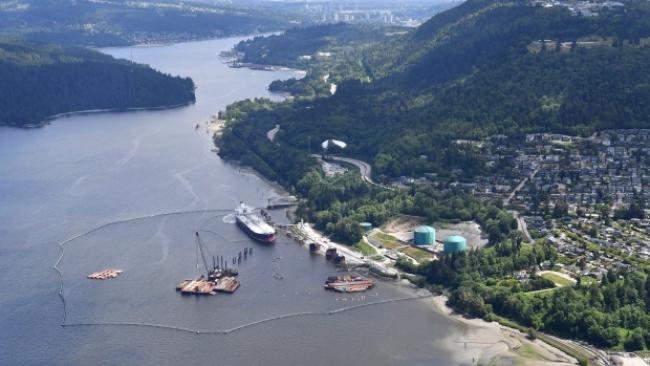Articles Menu

VANCOUVER -- Six First Nations that have filed another legal challenge against the Trans Mountain pipeline expansion say Canada's ownership of the corporation behind the project created a bias that prevented full consultations as ordered by the Federal Court of Appeal.
Chief Leah George-Wilson of the Tsleil-Waututh Nation said Canada had an opportunity to "get it right" but failed to take environmental risks into consideration as part of a rushed consultation process.
"It does feel like deja vu," George-Wilson said Tuesday, reflecting on the first court challenge 2 1/2 years ago that resulted in a ruling requiring the federal government to redo consultations.
The Federal Court of Appeal shelved the original approval last summer and the federal government approved the pipeline expansion again in June after a second round of consultations with First Nations.
"We have not seen any significant difference in the consultation process and in some ways it was worse," George-Wilson said.
She said she expects the latest approval will be overturned based on the same mistakes the federal government made the first time with its failure to conduct meaningful consultations.
The federal government purchased the pipeline and expansion project for $4.5 billion, saying it was in the national interest to build the country's energy infrastructure and to preserve jobs.
However, George-Wilson said Canada was unresponsive to oil spill risks to whales and climate change. She also accused the government of not being forthcoming with information.
"Canada withheld information regarding their scientific assessments of diluted bitumen impacts and only provided this information to Tseil Watuth after the formal close of consultation," she said.
Prime Minister Justin Trudeau said after announcing the second approval of the pipeline that Natural Resources Minister Amarjeet Sohi held meetings and met with Indigenous groups as part of the process. Sohi has said Ottawa can demonstrate that is has listened to the concerns of Indigenous communities and responded to them.
Vanessa Adams, Sohi's press secretary, said Tuesday the government cannot comment on the legal action because it is before the courts.
But she said in an email the government is confident it followed the guidance of the Federal Court of Appeal and "fulfilled our duty to consult with Indigenous communities by engaging in meaningful, two-way dialogue."
Chief Ron Ignace of the Stk'emlupsemc te Secwepemc Nation in Kamloops, B.C., said the second round of "harried" consultations did not provide the opportunity to respond to complex questions.
"I would like to say to the ordinary people across Canada: Our fight is not with you, our fight is with your government, with the leaders that are making these kinds of decisions. However, you have a duty and a responsibility to see that your governments do the right thing by us, and that's for both provincial and federal governments."
Lawyer Merle Alexander, who represents the Shxw'owhamel First Nation near Hope, B.C., said it initially supported the pipeline but chose to oppose it because an oil spill would destroy its sacred burial and archeological sites as well as the community's sole source of water.
Alexander said that as with all First Nations that were supportive of the pipeline, the Shxw'owhamel were not consulted the first time but expected a deep consultation after it changed course and started opposing the project last December.
"But in fact what happened was a very superficial and often contrived process where the Crown seemed to already have a list of accommodations that it was willing to accept, had created this list and just sort of waited to roll them out."
The First Nation had asked for about 20 concrete measures but Canada's accommodations included items that had not been requested, Alexander said.
"In our experience it didn't seem like the process was ever in good faith. It seemed like they had decided ahead of time what the accommodation measures would be before ever meeting First Nations. It was intended to create a false narrative of consultations so that Canadians would feel, 'OK, at least they went out there and tried harder with First Nations.' "
Alexander said the legal strategy this time around is expected to involve a "forensic look" into how consultations occurred, whether the federal government acted in good faith and weighed environmental issues involving species at risk including southern resident killer whales.
"The change-in-ownership issue will also be, I think, a very live issue of whether or not Canada was in a conflict of interest or had a reasonable apprehension of bias."
Fisheries Minister Jonathan Wilkinson has expressed the government's commitment to protect southern resident killer whales including measures announced in May to address key threats, among them a program to increase slow-down zones for commercial vessels near Vancouver's port and a requirement that vessels stay at least 400 metres away from the whales in their critical habitat.
[Photo: An aerial view of Kinder Morgan's Trans Mountain marine terminal, in Burnaby, B.C., is shown on Tuesday, May 29, 2018. THE CANADIAN PRESS Jonathan Hayward]